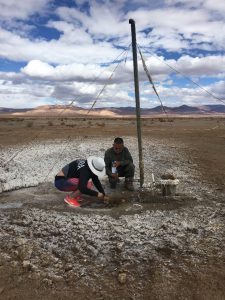Lithium will power our low-carbon future. It is essential for lightweight batteries used to store renewable energy and power electric cars. There are three main sources of lithium: geothermal brines found in granite bedrock, brines sourced from salt lakes (see image below), and lithium-bearing minerals from rocks. At present lithium is recovered from brines using chemical processing and/or evaporation. These are expensive or take a long time, and generate large quantities of waste. New supplies of lithium are needed to meet the growing global demand, and sustainable methods of extraction are also required. This applied geoscience PhD project will contribute to these goals by providing key data on the factors that control lithium behaviour in the critical zone, assessing the potential for using microbes to recover lithium, and assessing the environmental impact of lithium extraction, and therefore help support the transition to a low carbon economy.
 This project will investigate how microbial activity contributes to the weathering and mobilisation of lithium from different resource types, the potential for lithium biorecovery, and the environmental impacts of lithium extraction, through the testing the following hypotheses:
This project will investigate how microbial activity contributes to the weathering and mobilisation of lithium from different resource types, the potential for lithium biorecovery, and the environmental impacts of lithium extraction, through the testing the following hypotheses:
- Microbial communities are present in lithium deposits, they contribute to the biogeochemical weathering of hard rock minerals, and influence the behaviour of lithium in brines.
- Microbes can be used to recover lithium from brines, such as through sorption to biomass, or via the precipitation of lithium biominerals.
- Lithium mine waste from a range of geological settings does not contain potentially toxic elements. The composition of lithium mine waste is poorly characterised in general, and we will seek to address this by characterising the composition of soils and wastes from lithium extraction.
The research will involve field and laboratory work such as: field sampling of soil profiles, brines and wastes from Li extraction; mineralogy and geochemistry analyses to characterise field samples via XRD, XRF, SEM, ICP-MS; microbiology experiments such as microcosms to simulate biogeochemical weathering and sorption/precipitation experiments using microbial cultures; molecular biology applying next generation DNA sequencing to characterise microbial communities in field samples. Flexibilities exist for the student to be involved in experimental design and in decisions regarding choice of analytical techniques.
The student will be supervised by experts in geomicrobiology and biogeochemistry (Newsome) and environmental mineralogy and sustainable mining (Hudson-Edwards), and will be part of the EM3 research group within Camborne School of Mines (http://blogs.exeter.ac.uk/em3group/). As well as being part of the GeoNetZero CDT (https://geo-net-zero.hw.ac.uk/), the student will have access to a wealth of training opportunities from the University of Exeter’s Researcher Development Programme, which offers a wide range of workshops, seminars, and online resources covering topics such as project management, writing, resilience and wellbeing, public engagement, research ethics, IT skills, careers prep, data sharing, and teaching.
The ideal candidate will have a strong background in a relevant discipline, such as Earth Sciences, Geoscience, Geology, Microbiology, Molecular Biology, Environmental Chemistry, or Biology, with a particular interest in environmental geomicrobiology and geochemistry.
Location and eligibility:
Camborne School of Mines, Cornwall Campus
The University of Exeter’s College of Engineering, Mathematics and Physical Sciences, is inviting applications for a fully-funded PhD studentship to commence in September 2021 or as soon as possible thereafter. For eligible students who meet the residency requirements outlined by the NERC the studentship will cover home student tuition fees plus an annual tax-free stipend of at least £15,285 for 4 years full-time, or pro rata for part-time study. Students from EU countries who do not meet the residency requirements may still be eligible for a fees-only award but no stipend. Applicants who are classed as International for tuition fee purposes are not eligible for funding. Further information about eligibility can be found here.
Entry requirements:
Applicants for this studentship must have obtained, or be about to obtain, a First or Upper Second Class UK Honours degree, or the equivalent qualifications gained outside the UK, in an appropriate area of science or technology.
If English is not your first language you will need to have achieved at least 6.0 in IELTS and no less than 6.0 in any section by the start of the project. Alternative tests may be acceptable (see http://www.exeter.ac.uk/postgraduate/apply/english/).
How to apply
In the application process (http://www.exeter.ac.uk/studying/funding/award/?id=4085) you will be asked to upload several documents.
- CV
- Letter of application (outlining your academic interests, prior research experience and reasons for wishing to undertake the project).
- Transcript(s) giving full details of subjects studied and grades/marks obtained (this should be an interim transcript if you are still studying)
- Two references from referees familiar with your academic work. If your referees prefer, they can email the reference direct to quoting the studentship reference number.
- If you are not a national of a majority English-speaking country you will need to submit evidence of your proficiency in English.
The closing date for applications is midnight on 1 February 2021. Interviews will be held on-line or on the University of Exeter Penryn Campus the week commencing 1 March 2021.
If you have any general enquiries about the application process please email or phone 0300 555 60 60 (UK callers) +44 (0) 1392 723044 (EU/International callers) Project-specific queries should be directed to the main supervisor (l.newsome@exeter.ac.uk).